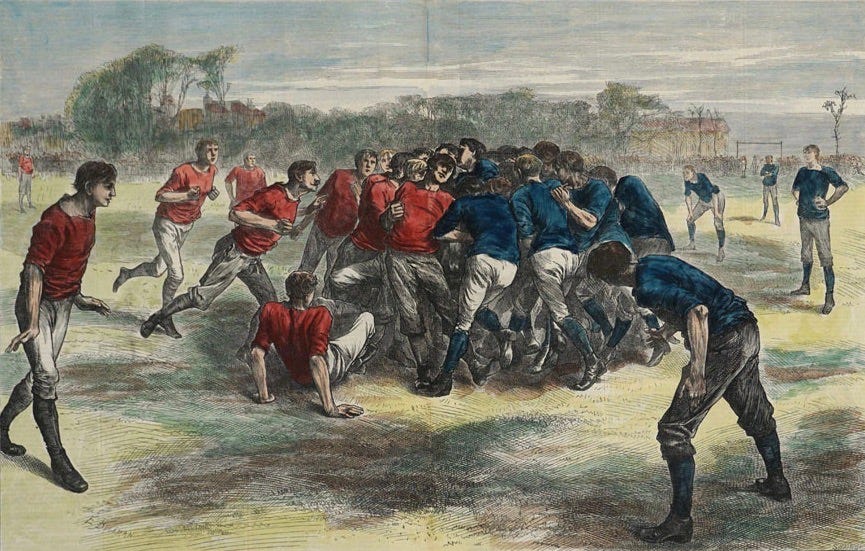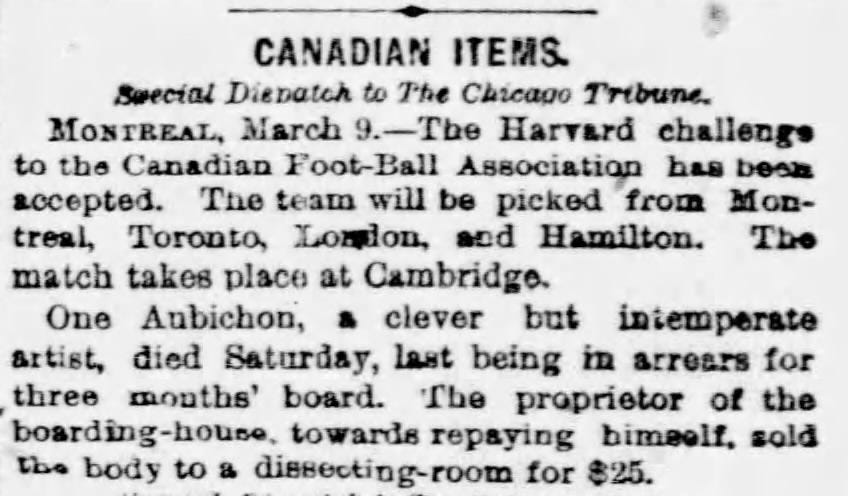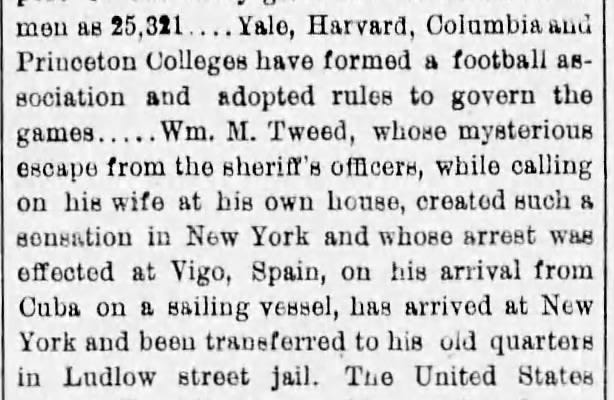Today's Tidbit... When Did Football Really Begin?
One year ago today, I sent the first issue of Today's Tidbits to a subscriber list of one: me. Some stories on Football Archaeology show earlier publishing dates because I imported 100+ articles from my old site, but today is the first anniversary of Football Archaeology!
The Tidbit I sent one year ago covered one of my favorite stories of a multi-sport athlete, Dick Reichle. Reichle started for Great Lakes Naval in the 1919 Rose Bowl before returning to the University of Illinois, where he was in the lineup in 1922 when his coach, Bob Zuppke, introduced football's modern huddle. After being in the first modern huddle, Reichle's multi-sport connection came while playing for the Boston Red Sox, which you can read about in a one-year-old Tidbit When Dick Reichle Huddled and Homered.
Perhaps the best way to recognize the anniversary of Football Archaeology is to address a fundamental football question, like when football began? Which event marks football's birthday? So, here's a quick attempt to argue that football did not start with games between Rutgers and Princeton in 1869 but with a rules meeting that occurred seven years later.
Football emerged from a stew of 14th to 19th-century British folk games that began coalescing into distinct sports like soccer and rugby in the mid-1800s. That stew crossed the Atlantic to the colonies and former colonies repeatedly.

By the 1860s, Americans played a mix of local football games, and, like the folks in Britain, they grew tired of arguing about the rules every time they tried to play someone from a different town or school. Arguing proved sufficiently bothersome in Britain that proponents of soccer and rugby agreed to formal rules for their games so everyone could play by one set of rules.
The situation was much the same on the Atlantic's west side. Americans and Canadians played a mix of local games, though the smart set in American colleges began following the British rules for soccer. Of course, the Canadians played soccer too, but rugby proved popular there. In both countries, however, many continued playing folk games without fixed rules when they weren't fiddlin' or whittlin'.
So, when did football begin?
Although most trace football's origins in America to the Rutgers and Princeton games of 1869, they played them under negotiated rules that combine soccer and folk rules. The 25 players per side kicked a round ball they could not carry, so the game resembled soccer more than rugby. The primary reason people consider those games to be the birth of football is that Parke H. Davis, football's first historian and a Princetonian, argued that those games were football's start. His writings became the authority on the matter.
The problem, of course, is that Princeton and Rutgers did not play football in those games. The game North Americans call football developed only after Princeton and others explicitly rejected soccer a few years later.
So, when did football begin?
Americans continued playing a mix of games in the early 1870s, highlighted by one event that pushed us toward soccer and two that took us down the rugby path.
First came an agreement in 1873 among Yale, Princeton, and Rutgers to form the Intercollegiate Football Association to play games under London's Football Association rules, which meant they played soccer—the IFA teams and others playing intercollegiate soccer for the next few years with one or two exceptions.
The second key event came when the boys at Harvard and Montreal's McGill University agreed to play one another in May 1874. Harvard did not play soccer. Instead, they played a folk game unique to Boston that had similarities with the version of rugby played by McGill. (A PDF version of The Football Association of Canada Rules (1873) is here.) Harvard and McGill played two games, one under Boston rules and the second under McGill's rugby union rules. Afterward, the Harvard boys realized they preferred the rugby game to their own, so they adopted it, playing among themselves since others played soccer. The following year, Harvard agreed to a game with Yale played under rugby-like "concessionary rules," a contest that convinced Yale of rugby's merits. Although Yale began playing rugby, the other American colleges did not, so Harvard continued playing the boys to the north.

The 1876 season saw a handful of games played under rugby rules, or nearly so. In a November 23, 1876, IFA meeting called by Princeton, Harvard and Yale convinced the other schools to play intercollegiate games under rugby's rules. As a result, rugby displaced soccer as the key intercollegiate sport.
The rules agreed to in the 1876 IFA meeting were virtually identical to the 1873 Football Association of Canada Rules mentioned above since both relied on the rugby union's rules.

So, when did football begin?
It began at the 1876 IFA meeting when several schools set those rules. The IFA effectively set football's rules for the next twenty years as they tweaked, revised, amended, and otherwise updated the rugby rules to meet their preferences until the compounding effect of those changes gave us the distinct game we enjoy today. Moreover, every football rule book today descends directly from the slightly tweaked rugby rules adopted at the 1876 IFA meeting.
So, while I celebrated football's 150th anniversary in 2019, like many others, I did so with my fingers crossed, knowing its actual 150th anniversary would not come until 2026. Hopefully, Football Archaeology will be around three years from now. Either way, today is the day to start planning for our great game's 150th birthday celebration three years from now.
Football Archaeology is reader-supported. Click here to buy one of my books or otherwise support the site.


The Rutgers-Princeton games were a big deal. They were the first intercollegiate games between American colleges playing a football-like game. (Crew and baseball preceded "football.") Warding, interference, or blocking arrived in 1884. See this post for more: https://www.footballarchaeology.com/p/todays-tidbit-1876-ifa-rule-22-onside
The rule of possession arrived in 1880, but teams were not required to gain yardage in a set number of downs until 1884. You can read more about that here: https://www.footballarchaeology.com/p/todays-tidbit-1876-ifa-rule-11-scrimmage
Tidbits are intended to touch on a point without a deeper discussion of where things fit from a broader context. My book, How Football Became Football, pieces together many of those issues.
Let me know if you have other questions.
Danke schoen, baby!